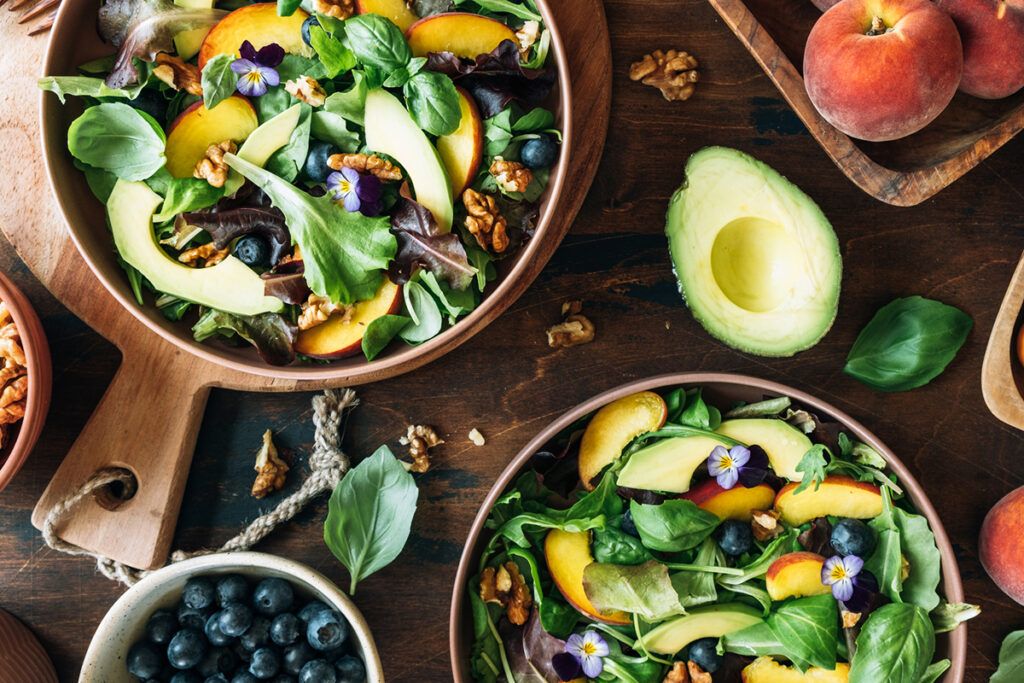What you eat can affect how you feel and your overall mood. While we all feel anxious sometimes, some people may experience heightened anxiety that affects their daily lives. This can often result from a condition such as generalized anxiety disorder (GAD).
Treating an anxiety disorder often involves talk therapy and medication. Certain lifestyle measures, such as dietary changes, may also help. In fact, research suggests that certain foods can help reduce the symptoms of anxiety.
The following nourishing foods may reduce inflammation in the body and improve gut health, both of which could help improve anxiety symptoms.
Vegetables and fruits

Eating a diet rich in fresh fruits and vegetables can help improve both your physical and mental health. A review of studies from 2021 found that people who consumed more fruits and vegetables were less likely to experience anxiety.
Examples of fruit and vegetables that may help with anxiety symptoms include:
- blueberries
- bananas
- leafy greens
- citrus fruits, such as oranges
- avocados
Fermented foods
Fermented foods like yogurt, kefir, and kimchi could help improve anxiety symptoms. A 2015 study found that young adults who ate more fermented foods were less likely to experience social anxiety.
A review of studies from 2019 also suggests that improving gut health can help with anxiety. And eating more fermented foods can help improve gut health.
So, adding certain foods, like yogurt and sauerkraut, into your diet could help improve both your gut health and your mental health. Yet more research is needed to confirm the benefits of fermented foods for anxiety.
Foods rich in omega-3 fats
The 2021 review mentioned earlier also suggests that adding more omega-3 fats to your diet could help with anxiety.
Omega-3 fats are found in several foods such as:
- oily fish like salmon
- flaxseeds
- chia seeds
- walnuts
Turmeric
Turmeric is a spice that originally comes from South Asia. The beneficial ingredient in turmeric is called curcumin. Research from 2021 suggests that curcumin could help reduce anxiety.
A 2020 study involving 80 participants with diabetes found that supplementing with curcumin reduced anxiety in some instances. Yet the evidence was inconclusive, and further research is still needed to understand whether turmeric can effectively reduce anxiety symptoms.
When consuming fresh or powdered turmeric with meals, it can help to add black pepper and some fats, like olive oil. This can improve your body’s ability to absorb the curcumin.
Aside from using turmeric as a spice, you can take it in supplement form, which you can find at most local health food stores. It’s important to discuss any supplements with a healthcare professional before adding them to your diet.
Can following a specific diet help with anxiety?
There isn’t one single diet that will work for everyone with anxiety. But a 2020 review of research suggests that a Mediterranean diet can help improve your mental health.
A Mediterranean diet includes:
- lots of vegetables, fruits, nuts, and legumes
- olive oil and other healthy fats, like avocados and nuts
- some whole grains
- some eggs, dairy products, fish, and poultry
- red meat (occasionally)
Foods to avoid with anxiety
Some foods and drinks may worsen anxiety symptoms.
It may be helpful to avoid or reduce the following if you experience anxiety:
- Ultra-processed foods: Ultra-processed foods are foods like frozen meals and packaged snacks that often have lots of added fat, salt, and sugar. A 2022 study on 10,359 adults found that people who ate the most ultra-processed foods had more “anxious days” than those who ate fewer of these foods.
- Caffeine: Caffeine is found in coffee and black tea but also in foods like dark chocolate. The American Psychiatric Association (APA) says that reducing your caffeine intake can help improve anxiety symptoms.
- Aspartame: A 2022 study on rats suggests that the sweetener aspartame, found in many low fat snacks and drinks, could be linked to anxiety symptoms.
- Sugar and refined carbohydrates: A review from 2021 suggests that eating too many sweet foods, such as cookies, or refined carbohydrates like white bread may make anxiety symptoms worse.
Other treatments
Alongside dietary changes, several other things can help you to manage anxiety. A doctor may recommend talk therapy like cognitive behavioral therapy or acceptance and commitment therapy as an anxiety treatment.
Several medications can also help with anxiety such as:
- selective serotonin reuptake inhibitors, like sertraline (Zoloft) and fluoxetine (Prozac)
- serotonin-norepinephrine reuptake inhibitors, such as venlafaxine (Pristiq)
- benzodiazepines like alprazolam (Xanax), which can be used short term
- tricyclic antidepressants, like imipramine (Tofranil)
Lifestyle measures may also help you manage anxiety, such as:
- Exercise: A review from 2023 found that exercise can help with anxiety symptoms. Exercises that may reduce anxiety include:
- aerobic exercises, such as swimming and cycling
- yoga
- running
- jogging
- Getting enough sleep: The APA suggests that prioritizing sleep is important for reducing anxiety and boosting mental well-being.
- Relaxation tools: The National Center for Complementary and Integrative Health suggests that relaxation techniques and mindfulness meditation could all help manage anxiety symptoms.
If you need help covering the cost of medications, the free Optum Perks Discount Card could help you save up to 80% on prescription drugs. Follow the links on drug names for savings on that medication, or search for a specific drug here.
